Olympian Profile: Patrick Chan
Patrick Chan wears a heavy mantle on his shoulders heading to the Sochi Olympic Games.
He’s going into the event as a three-time world champion – a difficult feat in this era of the Code of Points judging system. He sets and resets world scoring records. And Canada has never won Olympic gold in the men’s figure skating event, despite its storied history with skaters such as Donald Jackson, Toller Cranston, Brian Orser, Kurt Browning, Elvis Stojko and Jeff Buttle.
Chan’s path to Sochi hasn’t always been smooth. Since he finished fifth at the Vancouver Olympics, a fledging who had been overcoming an injury, he quickly learned a consistent quad, and dominated competition, until his peers began to find ways to catch up. But there is no denying his power. He has a rare skill set.
“He’s unlike any other skater,” says Buttle, who choreographed his current, record-setting Olympic short program.
“His skate-ability is the best, bar none,” says current choreographer David Wilson, who has designed his epic Olympic free skate to the “Four Seasons.”
Chan currently holds two world scoring records, mainly from his brilliant win at the Trophy Eric Bompard in France last fall. He regained his world record of 98.52 in the short program from Yuzuru Hanyu during that magical effort in France, until Hanyu took it back at the Grand Prix Final, where he defeated Chan.
But Chan’s marks for the free skate (196.75) and for total score (295.27) from France still stand. He did chalk up a score of 302.14 points (winning by 62.70 points over runner-up Kevin Reynolds) at a past Canadian championship, but of course, national scores don’t count. Hanyu earned 297.80 points for his win at the Japanese championships in December, 2013.
Born in Ottawa on New Year’s Eve of 1990 to Chinese immigrants Karen and Lewis Chan, Chan really wanted to play hockey, but ended up in the CanSkate program. He was already a going concern as a tiny 10-year-old when he finished third at the national juvenile championships under gravel-voiced coach Osborne Colson, who even then, knew he had a special skater. From there, Chan went from victory to victory in Canada, winning pre-novice, novice, and junior championships. His win at the 2014 Canadian championships in Ottawa was his seventh national senior title.
Chan is a skaters’ skater, with skills honed by Colson, who demanded the young boy spend half an hour each day on basic stroking. He’s left a legacy with Chan, probably the most powerful skater on the continent, able to gain top speed with a few strokes, seemingly effortlessly. Choreographer Lori Nichol also moulded Chan into her vision of what she thought a male skater should be: with feet as intricate as those of an ice dancer. Nichol, who took Chan from a young teenager to a world star, says she could give him a simple step, but add his speed and depth of curve and the lean he gets on his blade, and suddenly the step isn’t so easy. He rarely uses simple crossovers to gain speed. There are hops and turns and unexpected changes of direction in his routine. His feet are never still. It takes incredible conditioning to maintain that effort over the four minutes, 40 seconds of the long program. Because of it, Chan has had to carefully find a rhythm, a pace throughout it.
To every student she teaches, Nichol shows videos of 1976 Olympic champion John Curry, with whom she used to skate professionally. Curry, she said, was “a true master of refinement and quality.” Chan is a more powerful skater than Curry was, but she says now that Chan has mastered his power, “a gentler refinement can come into play,” she says.
Now that Chan is 24, he’s taken responsibility for his work, his training, his music choices, his nutrition and his off-ice time. He won last season, without having the right tools, he notes. “But this season, I’m in a very different place,” he says. He’s in a much happier place, training in Detroit, surrounded by friends such as Canadian teammate Elladj Baldé and American skater Jeremy Abott. It could make all the difference.
He hasn’t added any more quads this year, staying with the quad toe loop, solely and in combination with a triple toe loop. “I believe I have all the elements I need,” he said. His biggest challenge will be triple Axels, and the mental aspect, conquering doubts. He’s trained diligently all last summer, instilling the muscle memory and the pacing into his programs. He didn’t tour.
Chan wants to put himself into the same mindset as Detroit Tigers pitcher Justin Verlander, considered one of the best pitchers of his generation, who, after he won a game against the Boston Red Sox during the World Series, was asked when he knew he was going to win. “The minute I stepped on the mound,” he said.
“I noticed that when I won my first world championships, when I stepped on the ice, I knew I was going to win,” Chan said. “There was no question. There was no doubt. There was no worry.” Everything he has done this season, win or not, has been a step to Sochi, working through the things he needs to nail.
Everyone around him sees it. Chan says Baldé has helped him tremendously. “He’s training better than ever in his life,” Baldé says. “I’ve personally never seen him skate the way he is right now. And that’s kinda scary, because he’s already three-time world champion. He’s going on the road where he’s going to be one of the greats.”
Want to read more about the figure skaters who will compete at the 2014 Olympic Games in Sochi? Pick up Beverley Smith’s new book SKATING TO SOCHI! The book profiles the top 40 athletes/teams with full-colour photos! Order online: Amazon.com, Lulu.com (ebook) or iTunes (ebook).
Beverley Smith


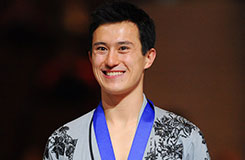

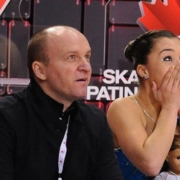
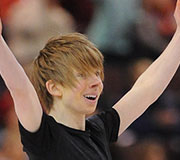
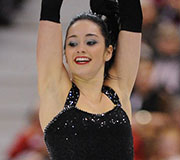

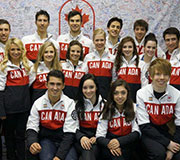
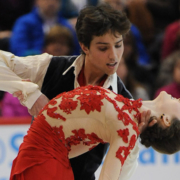
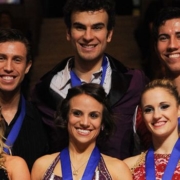


Leave a Reply
Want to join the discussion?Feel free to contribute!